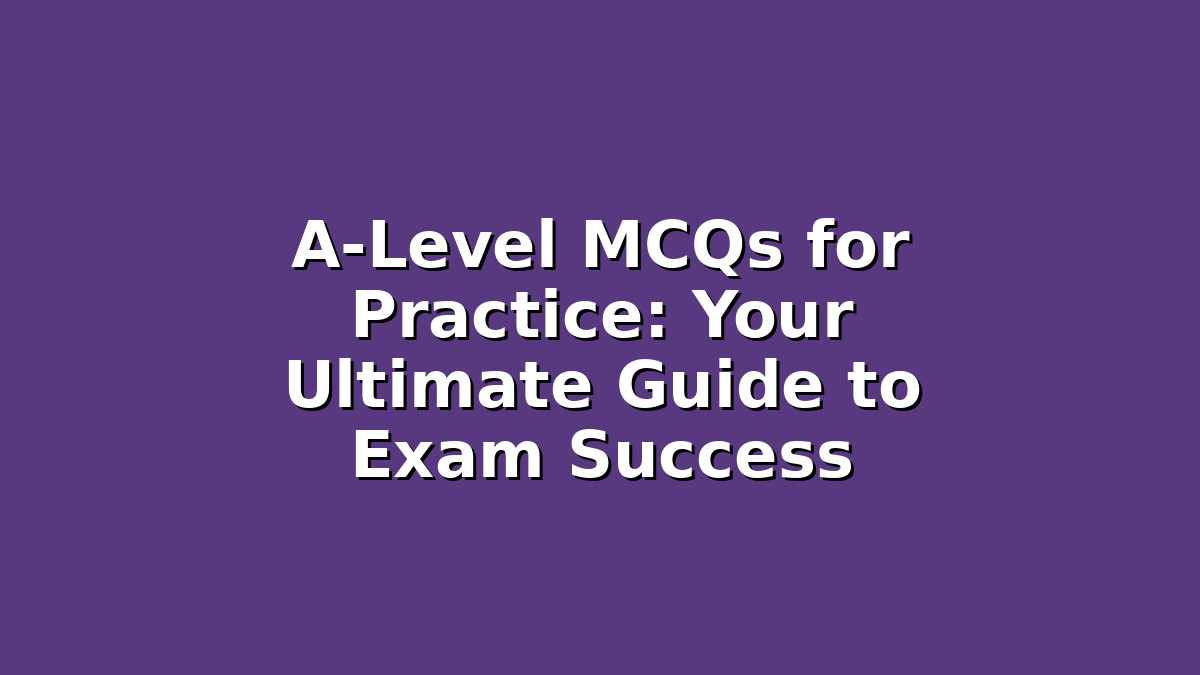Preparing for A-Level exams can feel overwhelming, especially with the vast amount of content you need to master. One of the most effective ways to boost your confidence and improve your knowledge retention is by incorporating Multiple Choice Questions (MCQs) into your study routine. Whether you’re revising Biology, Chemistry, History, or any other A-Level subject, practicing MCQs can help you assess your understanding, identify gaps, and sharpen your exam technique.
In this article, we’ll explore why A-Level MCQs are such a valuable study tool and share practical advice on how to use them effectively. If you’re a student aiming for top grades or simply wanting to improve your exam preparation strategy, this guide is for you.
Why Practice A-Level MCQs is Essential
MCQs are a staple of many A-Level exams because they test a wide range of knowledge in a compact format. Each question challenges your understanding of key concepts and your ability to apply them quickly and accurately. Here’s why practicing MCQs should be a core part of your study plan:
– Improves Knowledge Recall: MCQs encourage active recall, a proven method to strengthen memory. Instead of passively reading notes, you retrieve information, which helps cement it in your brain.
– Identifies Weak Areas: By reviewing which MCQs you get wrong, you can pinpoint topics that need more attention, allowing you to focus your revision more efficiently.
– Enhances Exam Technique: Multiple choice questions often feature tricky distractors designed to test your depth of understanding. Regular practice helps you develop strategies to eliminate wrong answers and avoid common pitfalls.
– Builds Exam Confidence: Familiarity with the question format reduces anxiety and increases speed during the actual exam.
Section 1: How to Integrate MCQs into Your Study Routine
To maximize the benefits of MCQ practice, it’s important to use them strategically. Here are some tips on how to seamlessly incorporate MCQs into your revision:
– Start Early and Be Consistent: Don’t wait until the last minute to try MCQs. Begin practicing as soon as you start your revision and make it a daily habit. Even 20-30 minutes of focused MCQ practice can yield significant improvements.
– Use a Variety of Sources: A-Level MCQs are available in textbooks, revision guides, online question banks, and past papers. Using diverse resources exposes you to different question styles and difficulty levels.
– Mix Topics: Instead of sticking to one topic per session, try mixing questions from different subjects or chapters. This mimics the exam experience and helps improve recall across your entire syllabus.
– Review Explanations: Don’t just mark answers as right or wrong—take the time to read explanations. Understanding why an answer is correct or incorrect deepens your knowledge and prevents repeating mistakes.
Section 2: Tips for Answering A-Level MCQs Effectively
Answering MCQs isn’t just about guessing—it requires careful thought and strategy. Here’s how to improve your approach:
– Read the Question Carefully: Pay close attention to wording, especially qualifiers like “not,” “always,” or “except.” A single word can completely change the meaning of a question.
– Eliminate Obviously Wrong Answers: Cross out answers that you know are incorrect to narrow down your options. This increases your chances if you need to make an educated guess.
– Look for Clues in Other Questions: Sometimes other questions on the paper provide hints or reinforce concepts that can help you answer tricky MCQs.
– Manage Your Time: Don’t spend too long on any one question. If you’re stuck, move on and come back later if time permits. Practicing timed MCQ quizzes can help you develop a good pace.
Section 3: Using MCQs to Boost Your Confidence and Reduce Exam Stress
Exams can be stressful, but practicing MCQs can help you feel more prepared and calm on the big day. Here’s how:
– Track Your Progress: Regularly practicing MCQs and reviewing your scores can show you how much you’ve improved, boosting your motivation.
– Simulate Exam Conditions: Try doing MCQ practice under timed, quiet conditions similar to your actual exam. This will make the real exam feel more familiar and less intimidating.
– Focus on Small Wins: Celebrate when you master a challenging topic or improve your quiz scores. Positive reinforcement helps maintain a healthy study mindset.
– Use MCQs for Active Revision: Instead of passively rereading notes, MCQs force you to think critically and engage with the material, which reduces last-minute cramming anxiety.
Conclusion
Incorporating A-Level MCQs into your revision is a smart and effective way to prepare for your exams. They help reinforce your knowledge, expose weak spots, improve your exam technique, and build your confidence. Remember to practice consistently, review your mistakes, and approach each MCQ with a clear strategy. With dedication and the right tools, you can turn MCQs into your secret weapon for A-Level success.
Keep practicing, stay positive, and believe in your ability to achieve great results. Good luck!

Responses